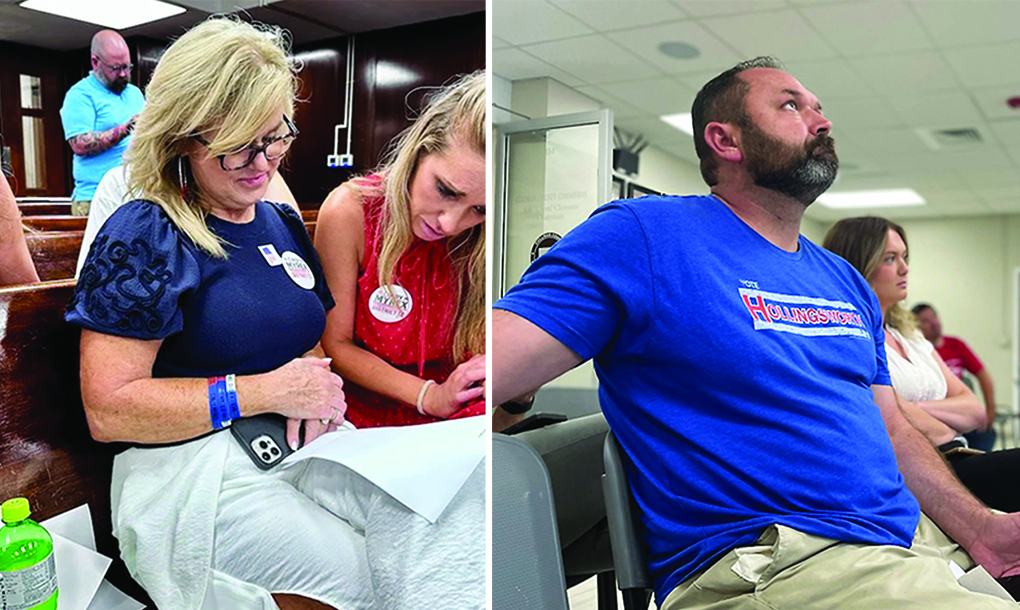Experts say broken system failed mentally ill gunman
Published 1:45 pm Tuesday, May 31, 2016

- This home at 2 Currier Drive in Londonderry was at the center of a police blockade.
Neighbors were skeptical of him from the beginning.
First, he hand-delivered a typed letter introducing himself to the neighborhood and claiming he was under 24/7 surveillance. He installed cameras on his property pointing toward the other homes on the block and often angrily confronted his neighbors, irate over their barking dogs.
Trending
On May 24, Richard “Dick” Robert Verville, 71, shot and killed Dan Rabideau, 59, while he worked on Verville’s heating unit in Londonderry, New Hampshire, officials said. He then shot himself in the head; he died of his injuries at a Massachusetts hospital the next day.
According to a statement from Jeff Strelzin, senior assistant attorney general and chief of the homicide unit, there is no evidence to suggest the two men had any interactions or relationship outside of Verville’s prior patronage of Rabideau’s employer, City Fuel.
Verville appears to have shot Rabideau in the back of the head while he was performing an annual tune-up on Verville’s heating system. He then went to another part of the house, where he shot himself. His autopsy confirmed the cause of death to be a single, self-inflicted gunshot wound.
Verville lived alone in a three-bedroom home in a quiet neighborhood not far from an apple orchard and kindergarten in Londonderry. Twice divorced by his own account, he moved back to New England in 2011 after spending 10 years living in Thailand. He had been single for at least 15 years.
Neighbors described Verville as a loner and a “problem.”
“We kind of recognized he was a bit of an oddball,” said Gary Fedorchuk, 55, who lived down the street from Verville. “We just steered clear.”
Trending
After receiving the letter in 2012, neighbors went to police with their concerns.
“The letter was brought to the police the day we got it,” said neighbor Kurt Kiley, “It brought more questions than answers.”
He said neighbors were eventually told by police there was nothing to worry about.
The message wasn’t threatening anyone and therefore the police couldn’t do anything legally, according to Londonderry Detective Chris Olson.
“No one said they were fearful of him at the time,” Olson said.
Kiley, 51, lived directly across the street from Verville. He took out a no-trespass order against the 71-year-old after witnessing his violent outbursts and being the target of his threats.
A few doors down 30-year resident Deb Belcher said her border terrier Jake angered Verville.
“Why a man who wanted a quiet retirement moved to a neighborhood with so many kids and dogs, I don’t know,” she said.
Belcher recalls one particular run in with Verville that left her feeling especially unsettled.
“He told me that my dog barked a lot, that I needed to train it and that if I couldn’t stop it, he’d call the police,” she said. “A short time later, he told me that he’d been watching me from his window to try to figure out what made Jake bark.”
After similar shared experiences, few of the neighbors were shocked by the news of what Verville had done.
UNIQUE CASE
Dr. Keith Ablow, a local best-selling author and psychiatrist who often studies criminal minds, said the system failed Verville.
“Every one of these cases I’ve looked at was preventable,” said Ablow, a former professor at Tufts University. “I wouldn’t be surprised if one or more people or one or more clinicians knew there were big problems with this person but hadn’t rendered the necessary treatment.”
Senior Assistant Attorney General Jeff Strelzin said Verville was suffering from “significant mental health issues” when he killed Rabideau and himself, but his weapon was legally purchased, suggesting that either the background check conducted before the firearm sale failed to recognize his illness or Verville was never hospitalized for any mental disease.
The overwhelming majority of murder-suicides are committed by men, but the victims are usually current or former romantic partners or the perpetrator’s own children. In one study, such victims made up more than 71 percent of all murder-suicides.
Jack Levin, co-director of the Brudnick Center on Violence and Conflict at Northeastern University, said it’s extremely rare for a murder-suicide perpetrator to kill a stranger. He suggested the possibility that the two men had a connection they kept private, but investigators have not indicated there was a relationship between them, and Rabideau’s family said they did not know Verville.
“It is extremely rare that a murder-suicide is committed by total strangers,” Levin said. “I always assume that the killer is not seriously mentally ill … but there are a few cases where mental illness does apply.”
In most murder-suicides, also known as dyadic deaths, the killer takes the lives of others either because of a perverted sense of love and loyalty or out of revenge, Levin said.
“In (cases involving mental illness), anything the victim does could be interpreted as a threatening gesture. Even something as trivial and benign as coughing or sneezing — almost anything,” Levin said. “Usually, the killer would be a middle-aged man who had suffered chronic depression over a long period of time and is set off by some situation that may appear to be innocuous to others but is catastrophic to him. That is especially true for stranger murder-suicides.”
Both Levin and Ablow said Verville’s actions — including the bizarre behavior his neighbors described over the last four years — are indicative of a man struggling with a “profound mental illness” and severe paranoia.
“All of these bizarre habits … seem to characterize a man who had no friends, lived alone, was isolated from conventional influences and may have seen the enemy even in the most harmless situation,” Levin said.
ABOUT VERVILLE
Verville spent most of his life in Maine. He was raised in Lewiston, and made the local newspaper, the Sun Journal, for his award-winning high school science project on animal skeletons, as well as his “pet alligator,” which he let freeze to death for his skeleton collection. He next appears in the newspaper to note his graduation from college and his assistantship at Rutgers University.
Verville went to college in Orono, and worked as a professor at the University of Maine at Presque Isle for much of his career. There, he worked at the school’s Cooperative Extension. According to its website, efforts are focused on the Maine food system, positive youth development, as well as community and economic development.
Verville also helped found the Maine Compost School, an affiliate of the university.
The program remains 15 years after Verville’s retirement. It’s intended to educate those who want to compost, but don’t have the knowledge of how to do it correctly, according to John Rebar, the current executive director of the Cooperative Extension.
Rebar recalls his colleague fondly.
“We worked together over the years. He was a leader in the development of the Maine Compost School,” Rebar said. “He had a successful run in providing composting education.”
ISOLATION
Although he was born into a family of three children, Verville was seemingly isolated while living in Londonderry. His brother died sometime before 2006, and he lost his sister to lung cancer in 2012, less than a year after moving back to the United States from Thailand.
Verville said in the letter he distributed to his neighbors that he had two children, but both appear to still live in Maine. His family could not be reached for comment.
The apparent isolation that Verville lived in likely contributed to the mental illness he suffered.
“The description of this man as living alone, of having few contacts … is very much consistent of someone who may have been laboring with an actual major mental disorder,” Ablow said. “The fact that someone might take a seemingly innocuous event, a very mundane occurrence … and expand upon that to a conspiracy theory makes someone like me wonder whether there was delusional thinking involved.”
Ablow said delusional thinking could be indicative of anything from schizophrenia to drug use.
“Once there’s a murder-suicide, everybody is a psychologist and sees every strange, bizarre, weird characteristic of the killer, but that’s not enough,” Levin said. “We need warning signs for people who are troubled long before they become troublesome.”
Levin said the red flags often become obvious only after it’s too late. But in this case, Verville delivered a telltale sign of distress in the letter he gave to neighbors when he moved into the community.
Ablow noted that the nation’s mental health care system is “shattered,” but said he would be “shocked” if “it turns out to be the case that every effort was made to avert this situation.”
“Right now, it’s like a comedy of errors,” Ablow said. “The mental health system is so shattered that this tragedy could happen again and again and again.”
Blessing and Edelstein are reporters at The (North Andover, Massachusetts) Eagle-Tribune.






